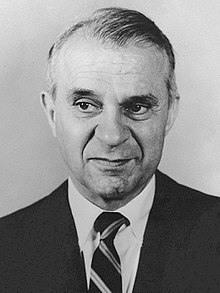Wassily Leontief
Wassily Leontief (born August 5, 1905 in Munich , † February 5, 1999 in New York ; originally Russian Василий Васильевич Леонтьев Wassili Wassiljewitsch Leontjew ) was a Russian- American economist who received the 1973 Alfred Nobel Memorial Prize for Economics .
biography
Career
Wassily Leontief was born in Munich in 1905 and grew up in St. Petersburg , where his father was a professor of economics. In 1921 he began studying philosophy and sociology , and later economics , at the University of Leningrad .
Leontief felt politically drawn to the Social Democratic Mensheviks and openly criticized the Communist Bolsheviks , for which he was even jailed for a short time. He himself described this time as a "good school"; it should also have influenced his scientific work.
Leontief later also studied economics and graduated in 1924. In 1925 he traveled to Germany and from 1927 to 1928 was an assistant at the Institute for the World Economy in Kiel . He wrote his dissertation in Berlin with Werner Sombart , a German economist . This appeared in 1928 under the title The economy as a cycle . The central idea of his work was to depict all goods flows in a society in one model .
In 1931 Leontief emigrated to the United States . At Harvard University in Cambridge (Massachusetts) he began his work on a general theory of equilibrium . Up to now, economists have only examined individual parts of the economy, for example how the change in a certain capital investment affects the volume of a certain production. In Leontief's equilibrium theory, however, it was examined what happens in the entire economy in such a case. He recorded the delivery relationships between different industries in large input-output tables . In 1936 his first essay on input-output analysis appeared .
In 1941 his book The Structure of American Economy, 1919–1929 , was published, which became famous due to the new way of presenting economic relationships. His method provided an exact description of the economic structure and even allowed predictions about the effects of economic policy interventions in this structure.
In 1946 Leontief was appointed professor. In 1970 he was the American Economic Association as president-elect before.
Wassily Leontief died in New York in 1999.
Dates of birth
Leontief's dates of birth were unclear for a long time. He himself assumed in his autobiography that he was born on August 5, 1906. However, in later years he found out that he had been born as early as 1905. His relatives were later able to receive his birth certificate , which shows Munich as the place of birth and August 5, 1905 as the date of birth. However, the Nobel Foundation continues to use the data that was known at the time of the award.
research
Leontief developed the input-output analysis , for the elaboration and application of which he received the 1973 Nobel Prize in important economic problems. As part of his input-output studies, he discovered in 1953 that the United States mainly exports goods that are labor-intensive. This contradicted the Heckscher-Ohlin theorem , from which it was concluded that the USA, as a capital-rich country, exports goods with a high capital content. This so-called Leontief paradox was only resolved in the 1960s.
The Leontief production function is named after Leontief . He is said to have further formulated the paradise paradox and, like Abba P. Lerner, improved Wilhelm Launhardt's calculations on the terms of trade effect .
membership
In 1942 Leontief was elected to the American Academy of Arts and Sciences , in 1951 to the American Philosophical Society , 1970 to the British Academy and 1974 to the National Academy of Sciences . In December 1988 he was accepted as a foreign member of the then Academy of Sciences of the USSR .
Leontief Prize
The economics prize named after him, the Leontief Prize , has been awarded in his honor by Tufts University since 2000 . Prize winners include the Nobel Prize winners Daniel Kahneman and Angus Deaton .
Honors
- 1970: Bernhard Harms Prize from the Kiel Institute for the World Economy
swell
- ↑ a b Message and link to the birth certificate ( memento from February 23, 2006 in the Internet Archive )
- ↑ Wassily Leontief in the Munzinger archive ( beginning of article freely available)
- ^ Past and Present Officers. aeaweb.org ( American Economic Association ), accessed October 28, 2015 .
- ↑ Quotation on the official page of the Nobel Prize
- ↑ Book of Members 1780 – present, Chapter L. (PDF; 1.1 MB) In: American Academy of Arts and Sciences (amacad.org). Retrieved March 23, 2018 .
- ^ Member History: Wassily Leontief. American Philosophical Society, accessed December 14, 2018 .
- ^ Deceased Fellows. British Academy, accessed June 28, 2020 .
- ^ Foreign members of the Russian Academy of Sciences since 1724. Wassili (Wassiljewitsch) Leontjew. Russian Academy of Sciences, accessed September 30, 2015 (Russian).
- ^ Leontief Prize for Advancing the Frontiers of Economic Thought. ase.tufts.edu, accessed October 28, 2015 .
- ↑ Bernhard Harms Prize. (No longer available online.) Ifw-kiel.de , archived from the original on June 14, 2013 ; Retrieved June 15, 2013 . Info: The archive link was inserted automatically and has not yet been checked. Please check the original and archive link according to the instructions and then remove this notice.
Web links
- Information from the Nobel Foundation on the 1973 award to Wasily Leontief
- Literature by and about Wassily Leontief in the catalog of the German National Library
| personal data | |
|---|---|
| SURNAME | Leontief, Wassily |
| ALTERNATIVE NAMES | Leontjew, Wassili Wassiljewitsch |
| BRIEF DESCRIPTION | Russian-American economist |
| DATE OF BIRTH | 5th August 1905 |
| PLACE OF BIRTH | Munich |
| DATE OF DEATH | February 5, 1999 |
| Place of death | new York |
